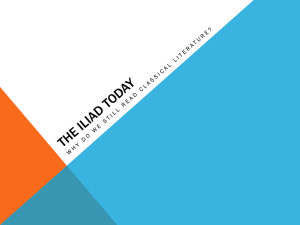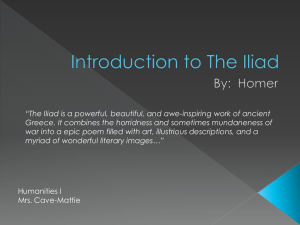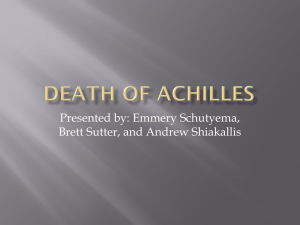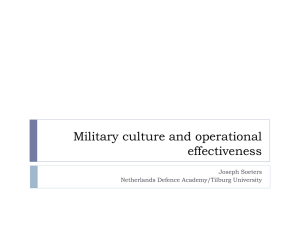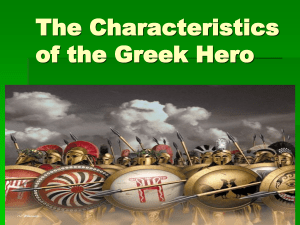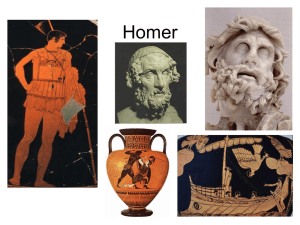Abstract
advertisement
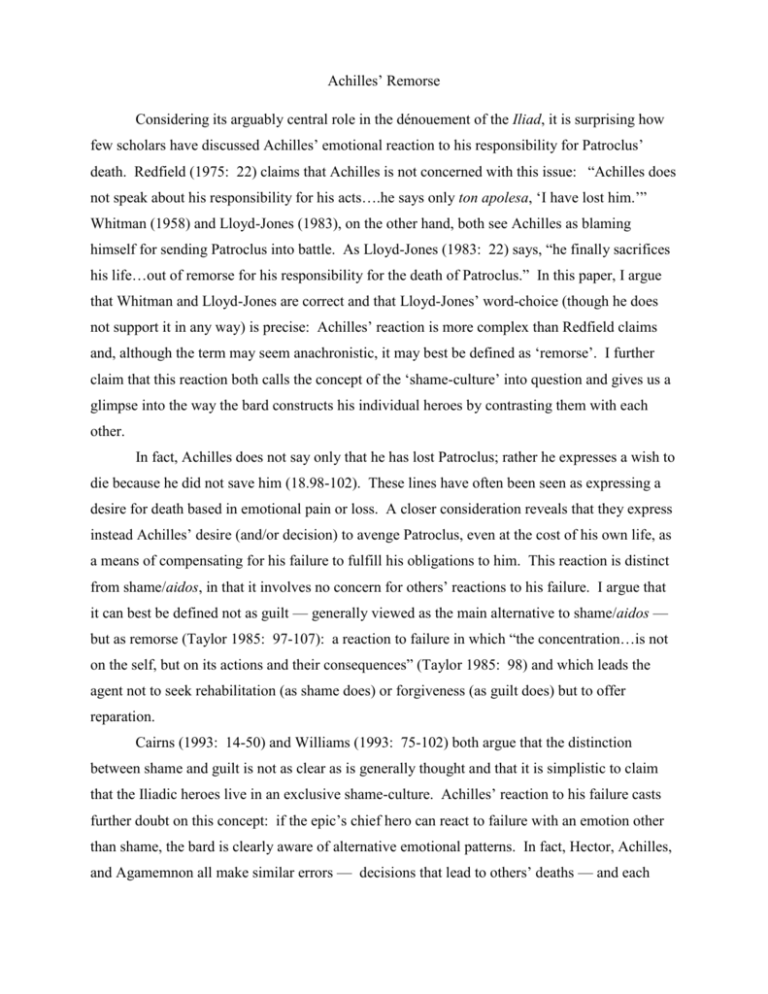
Achilles’ Remorse Considering its arguably central role in the dénouement of the Iliad, it is surprising how few scholars have discussed Achilles’ emotional reaction to his responsibility for Patroclus’ death. Redfield (1975: 22) claims that Achilles is not concerned with this issue: “Achilles does not speak about his responsibility for his acts….he says only ton apolesa, ‘I have lost him.’” Whitman (1958) and Lloyd-Jones (1983), on the other hand, both see Achilles as blaming himself for sending Patroclus into battle. As Lloyd-Jones (1983: 22) says, “he finally sacrifices his life…out of remorse for his responsibility for the death of Patroclus.” In this paper, I argue that Whitman and Lloyd-Jones are correct and that Lloyd-Jones’ word-choice (though he does not support it in any way) is precise: Achilles’ reaction is more complex than Redfield claims and, although the term may seem anachronistic, it may best be defined as ‘remorse’. I further claim that this reaction both calls the concept of the ‘shame-culture’ into question and gives us a glimpse into the way the bard constructs his individual heroes by contrasting them with each other. In fact, Achilles does not say only that he has lost Patroclus; rather he expresses a wish to die because he did not save him (18.98-102). These lines have often been seen as expressing a desire for death based in emotional pain or loss. A closer consideration reveals that they express instead Achilles’ desire (and/or decision) to avenge Patroclus, even at the cost of his own life, as a means of compensating for his failure to fulfill his obligations to him. This reaction is distinct from shame/aidos, in that it involves no concern for others’ reactions to his failure. I argue that it can best be defined not as guilt — generally viewed as the main alternative to shame/aidos — but as remorse (Taylor 1985: 97-107): a reaction to failure in which “the concentration…is not on the self, but on its actions and their consequences” (Taylor 1985: 98) and which leads the agent not to seek rehabilitation (as shame does) or forgiveness (as guilt does) but to offer reparation. Cairns (1993: 14-50) and Williams (1993: 75-102) both argue that the distinction between shame and guilt is not as clear as is generally thought and that it is simplistic to claim that the Iliadic heroes live in an exclusive shame-culture. Achilles’ reaction to his failure casts further doubt on this concept: if the epic’s chief hero can react to failure with an emotion other than shame, the bard is clearly aware of alternative emotional patterns. In fact, Hector, Achilles, and Agamemnon all make similar errors — decisions that lead to others’ deaths — and each reacts differently. Hector contrasts clearly with Achilles: he feels shame/aidos (22.104-7), as the consensus view would predict. Agamemnon, on the other hand (19.85-145, cp. 9.116-20) reacts with something like regret, an emotion one can feel about an unfortunate event for which one is not responsible (Taylor 1985: 98-9): he puts the blame for his action on the gods (as both of the other heroes could but do not) and offers to pay for his failure with goods, not his life. These contrasting failure-reactions show that the Iliad’s ‘shame-culture’ represents only a norm, in relation to which the bard defines the heroes’ emotions. An examination of the heroes’ failure reactions also casts a new light on the muchdisputed question of whether the heroes are characters in a modern sense or types (Collins 1988, especially 14-18; Dickson 1995.20-5). It provides an example of the way in which the bard constructs the type of characters that he deploys — however one defines them — by contrasting them with each other. The heroes’ reactions, furthermore, accord with other aspects of the bard’s portrayal of them. Hector is so consistently motivated by aidos that Redfield (1975: 119) calls him ‘a hero of aidos’. While Achilles, on the other hand, is concerned with others’ aidos towards himself (1.149, 11.649), both Ajax (implicitly, 9.639-40) and Apollo (explicitly, 24.44) criticize him for lacking aidos towards others. Thus his remorse is part of a consistent set of characteristics that the bard constructs for him by contrasting them with those of other key heroes. Cairns, Douglas 1993. Aidos: the psychology and ethics of honour and shame in ancient Greek literature. Clarendon Press. Collins, Leslie 1988. Studies in Characterization in the Iliad. Athenaeum Verlag. Dickson, Keith 1995. Nestor: Poetic Memory in Greek Epic. Garland Press. Lloyd-Jones, Hugh 1983. The Justice of Zeus, 2nd edition. University of California Press. Redfield, James 1994. Nature and Culture in the Iliad: the tragedy of Hector, 2nd edition. Duke University Press. Taylor, Gabriele 1985. Pride, Shame, and Guilt: emotions of self-assessment. Clarendon Press. Whitman, Cedric 1958. Homer and the Heroic Tradition. Harvard University Press. Williams, Bernard 1993. Shame and Necessity. University of California Press.
